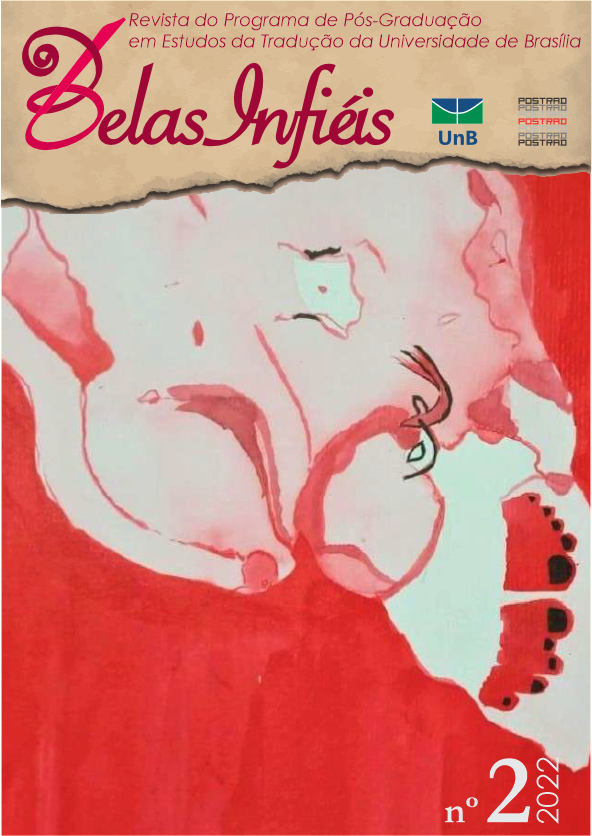Gender and the Division of Translation Labor: the Case of Translated Poetry in Brazil
DOI:
https://doi.org/10.26512/belasinfieis.v11.n2.2022.41365Keywords:
Sociology of Translation. Feminist Translation Studies. Sexual Division of Labor; Translated Poetry; Feminisms.Abstract
Although women make up most of the workforce employed in the translation market in Brazil, their labor is not employed in the same proportion when the translation of different textual genres and languages are concerned. Based on a study by sampling on translated poetry published by national publishers with an expressive production and circulation network, in this paper I argue that, in such editorial context, it is possible to establish relationships between the gender of translators and textual genres, as well as between the gender of translators and translated languages; relationships that are based on a male hierarchy anchored in the sexual division of labor. The same data set provided information about the genre and continent of origin of the translated authors, enabling reflections both on the division of writing work based on gender and the directionality of translation flows.
Downloads
References
Argoni, Mirella. (2005). A marginal(ized) perspective on translation history: women and translation in the eighteenth century. Meta, 50 (3), 817–830.
Association des Traducteurs Littéraires de France (ATLF). (2020). La situation socio-économique des traducteurs littéraires. https://www.atlf.org/wp-content/uploads/2020/10/ENQUETE-SOCIO-ECONOMIQUE.pdf.
Balibar, Françoise. (1991). ‘Traduire’, dit-elle... La traduction, une affaire de femmes? In G. Fraisse et al., L’exercice du savoir et la différence des sexes. L’Harmattan.
Biroli, Flávia. (2019). Gênero e desigualdades. Boitempo.
Buzelin, Hélène. (2011). Agents of Translation. In Handbook of Translation Studies. John Benjamins. https://benjamins.com/online/hts/articles/age1
Castro, Olga & Spoturno, María Laura. (2020). Feminismos y traducción: apuntes conceptuales y metodológicos para una tradutología feminista transnacional. Mutatis Mutandis, 13 (1), 11–44. https://revistas.udea.edu.co/index.php/mutatismutandis/article/view/340988/20795805
Chamberlain, Lory. (1988). Gender and the Metaphorics of Translation. Signs, 13 (3), 454–472. https://www.jstor.org/stable/3174168?origin=JSTOR-pdf&seq=1
Costa, Claudia de Lima & Alvarez, Sonia. (2013). A circulação das teorias feministas e os desafios da tradução. Estudos Feministas, 21 (2), 579–586. https://periodicos.ufsc.br/index.php/ref/article/view/S0104-026X2013000200009/25781
Cintrão, Heloísa Pezza. (2006) Competência tradutória, línguas próximas, interferência: efeitos hipnóticos em tradução direta. Tradterm, 12, 69–104.
Davis, Angela. (2016). Mulheres, raça e classe (H. R. Candiani, Trad.). Boitempo.
Federici, Silvia. (2017). Calibã e a bruxa. Mulheres, corpo e acumulação primitiva (Coletivo Sycorax, Trads.). Elefente.
Federici, Silvia. (2019). O ponto zero da revolução. Trabalho doméstico, reprodução e luta feminista (Coletivo Sycorax, Trads.). Elefente.
Fonseca, Luciana Carvalho & Silva-Reis, Dennys. (2018). Nineteenth century women translators in Brazil: from the novel to historiographical narrative. Revista Brasileira de Literatura Comparada, 34, 23–46. https://revista.abralic.org.br/index.php/revista/article/view/472
Freitas, Taís Viudes de. (2016). A quem serve a disponibilidade das mulheres? Relações entre gênero, trabalho e família [Tese de Doutorado, Universidade Estadual de Campinas].
Heinich, Nathalie. (1984). Les traducteurs littéraires: l’art et la profession. Revue Française de Sociologie, 25 (2), 264–280.
Hirata, Helena & Kergoat, Danièle. (2007). Novas configurações da divisão sexual do trabalho. Cadernos de Pesquisa, 37 (132), 595–609.
Kalinowski, Isabelle. (2002). La vocation au travail de traduction. Actes de la recherche en sciences sociales, 144, 47–54.
Mies, Maria. (2022). Patriarcado e acumulação em escala mundial. Mulheres na divisão internacional do trabalho (Trad. Coletiva). Ema Livros/Editora Timo.
Mhereb, Maria Teresa. (2021). Divisão sexual do trabalho e direcionalidade dos fluxos de tradução: o caso do romance traduzido no Brasil. In H. Amaral et al. (Eds.), Tradução em relação: espaços de transformação. Mercado de Letras.
Milton, John. (2004). Translated poetry in Brasil – 1965–2004. Revista Brasileira de Linguística Aplicada, 12 (6), 173–193.
Nogueira, Claudia Maria Franca Mazzei. (2004). A feminização no mundo do trabalho: entre a emancipação e a precarização. Editores Associados.
Saffioti, Heleieth. (2013). A mulher na sociedade de classes. Mito e realidade. Expressão Popular.
Sánchez, Lola. (2015). La traducción: un espacio de negociación, resistencia o ruptura de significados sociales de género. In L. Saletti-Cuesta, Traslaciones en los estúdios feministas. Perséfone Ediciones Electrónicas.
Ventosa, Carmen Francí. (2020). La feminización del ejercicio profesional de la traducción editorial: entre la precariedad y el entusiasmo. Transfer, 15 (1–2).
Venuti, Lawrence. (2021). A invisibilidade do tradutor (L. Pellegrin, L. M. Villela, M. D. Esqueda, V. Biondo, Trads.). Editora Unesp.
Wolf, Michaela. (2006). The Creation of a ‘Room of One’s Own’: Feminist Translators as Mediators between Cultures and Genders. In J. Santaemilia (Ed.), Gender, Sex and Translation. The manipulation of identities. Manchester: St. Jerome.
Wolf, Michaela. (2007). The emergency of a sociology of translation. In M. Wolf & A. Fukari (Eds.), Constructing a Sociology of Translation. John Benjamins.
Downloads
Published
How to Cite
Issue
Section
License
Copyright (c) 2022 CC BY

This work is licensed under a Creative Commons Attribution 4.0 International License.
Given the public access to this journal, the texts are free to use but requires the recognition of the original authorship and initial publication in this journal to be properly stated.
 The journal allows the use of works published for non-commercial purposes, including the right to submit the work to publicly accessible databases. Published contributions are the sole and exclusive responsibility of the author(s).Â



















